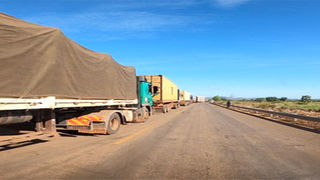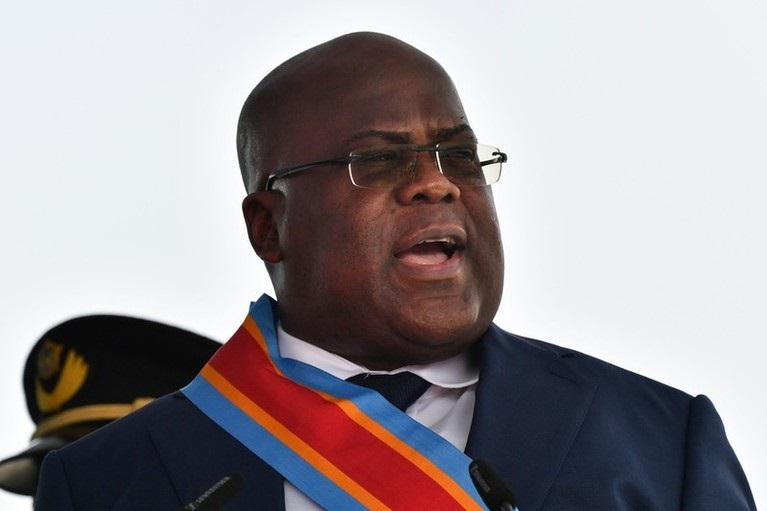
A queue of trucks at the border between Uganda and Democratic Republic of Congo. PHOTO/ Betty Ndagire
|Prosper
Prime
Can Uganda get its money’s worth in DRC?
What you need to know:
Despite Uganda’s “debatable” role in the northeastern Congo, the Kampala government has also played a “fireman role” in the conflict that keeps resurfacing over the last three decades. But what are the economic gains?
The Democratic Republic of Congo (DRC) continues to generate massive interest akin to the scramble or partition or even the conquest that the continent endured for decades, Prosper Magazine has learnt.
Between 1833 and 1914, Africa experienced colonisation, division, invasion and annexation, thanks to the foreign powers (mainly the European Colonisers), many of whom are still pulling strings in the DRC to date.
In the aforementioned period, the European colonisers shredded the virgin continent of Africa into protectorates, colonies and free-trade areas with the aim of having unrestricted access to the continent resources, by hook or crook.

Ugandan products in Democratic Republic of Congo. In 2021, trade between Uganda and the DRC stood at $687m, up from $479m in 2017 PHOTO/ BETTY NDAGIRE
For years now, another layer has been manifesting itself, only that this time, it is in the shape and form of largely regional and to some extent continental interest—actors.
Several African countries currently involved in the pacification of DRC, including from the neighbouring EAC member States say they are there for either security reasons or restoring some sanity in the resource-rich country.
But the question is: Is that the only end game?
In an interview with Mr Africa Kiiza, a PhD Fellow, Faculty of Business, Economics and Social Sciences; Universität Hamburg, it became obvious that DRC has much more to offer, explaining Uganda’s involvement in the ongoing pacification efforts.
Despite Uganda’s role in the northeastern Congo, being described as debatable, it is believed that the Kampala government has also played a “fireman role” in the conflicts that keep resurfacing over the last three decades.
For Uganda, her involvement, at least officially, is about ensuring her security and promoting trade and investment between the two countries as well as the region.
What is in it for Uganda?
Whereas a regional country like Kenya, tend to ride on the back of her pacification role to pave way for its corporations and institutions to do businesses and trade, Uganda seems to leave it up to the individual countrymen to find their way on their own. But, that perception seems to change, perhaps to some extent by design rather than default as previously thought.

Equity Group managing director James Mwangi (right) displays the agreement after the acquisition of majority stake in Banque Commerciale Du Congo. PHOTO/ COURTESY
“Indeed, so important is the DRC market that in 2021, Uganda launched a $330m road-building plan in the DRC with the objective of providing the much-needed trade-facilitating infrastructure,” Mr Kiiza told Prosper Magazine in an exclusive interview.
He continued: “Uganda’s trade interests in the DRC cannot be overemphasized. Indeed, in 2021, trade between Uganda and the DRC stood at $687m, up from $479m in 2017 and is projected to grow by 15 per cent annually for the next five years.
“The ongoing tension will slow down the pace of the much-needed road network whose building started in March 2022 with the construction of the 125-kilometre Kasindi-Beni-Butembo Road in the DRC.”
Individualistic business mindset
Already, corporation and institutions such as Equity Bank and KCB are consolidating their footprint in South Sudan and now DRC, Uganda, until the road project, has not thought about institutional investment in the neighbouring countries even where she played a major role in its pacification.
DR Congo is one of the biggest countries on the continent by land mass and has more than 90 million people, making it appealing to ambitious banks in the neighbouring states looking for growth.
In his analysis, researcher Kiiza Further discloses that, immediately after the admission of the DRC into the EAC, 26 Kenyan companies pledged to invest $1.6 billion in the country’s economy, with Equity Bank-Kenya acquiring a 66.53 per cent stake in the Banque Commerciale du Congo (BCDC) in addition to the already existing 86 per cent shareholding of ProCredit Bank in the same country.
“The ownership of the largest shares in the two biggest foreign banks in the DRC makes Equity Bank the largest bank in the DRC,” Mr Kiiza noted in his analysis.
Whereas such economic efforts are but too important to be jeopardised by a protracted war since not only the EAC but other African countries trading under the AfCFTA regime will suffer direct economic consequences due to missed cross-border trade, varied experts and analysts spoken to wondered, considering Uganda’s role in pacification of the neighbouring country, what is in it for her.
This question is being raised at the back of corporation and institutions such as Equity Bank and KCB consolidating their footprint in South Sudan and now DRC while Uganda, until the road project has not thought about institutional investment in the neighbouring countries despite her role the pacification of DRC, if any.
“All these speak to how businesses in Uganda are structured,” the director MUBS Economic Forum and senior lecturer in Department of Economics, MUBS, Dr Fred Muhumuza, said when interviewed last week on Wednesday.
He continued: “Institutionalisation, including in business, is something that we are still not very good at here. Cooperatives in Kenya are managed as an institution, but for our case here, it is more or less structured merely for advocacy purposes.”
But that doesn’t mean Uganda cannot benefit even in this individualistic approach model as opposed to structured way of doing business in DRC and related markets where Uganda is helping to restore sanity and security.
Although Kenya prefers the institutional model, Dr Muhumuza believes that majority of the beneficiaries of the established corporations in the neighbouring countries, including in DRC could be Ugandans.
“Remember, majority of traders are Ugandan exporters in these countries. So, who is KCB or Equity Bank financing?” he rhetorically asked, adding, “ Uganda can also transition from individualistic engagement to institutional. But this will have to be a long-term project, that the country should begin to think about now.”

Mr Africa Kiiza, a PhD Fellow, Faculty of Business, Economics and Social Sciences; Universität Hamburg.
Regional dynamics
Joining the DRC to the EAC not only increased the number of member states to seven but also meant that the EAC boasted of a $250 billion market of 300 million people which is about 25 per cent of Africa’s population, stretching from the Indian Ocean to the Atlantic Ocean.
“While joining the DRC to the EAC stirred mixed feelings, the benefits of this membership far outweighed the risks,” Mr Kiiza who is also a researcher and trade and regional integration expert, writes.
He continues: “Apart from the economic benefits, the possibility of pacification of the great lakes region, especially the DRC was possible, given the fact that under Article 5.3 (f), the EAC Treaty aims at promoting peace, security, and stability within, and good neighbourliness among the partner states. However, this is still a mirage.”
In October 2022, barely two months after DRC’s flag was hoisted at the EAC Secretariat to officially welcome it to the Community, fresh insurgencies resumed in the DRC between the government and M23 rebels. To date, the fighting has ramped up tensions between the DRC and its neighbour and fellow EAC member state- Rwanda, says Mr Kiiza expert analysis.
According to him, DRC accuses Rwanda of supporting the M23 rebels, something which he describes as the futuristic “Singapore of Africa” continues to deny.
“Regardless of who is to blame for this protracted war, the reality remains that this war is affecting the much-desired regional integration and intra-African trade, which are more critical for the realisation of the African Continental Free Trade Area (AfCFTA),” the former trade specialist with SEATINI Uganda, writes.
For a continent whose intra-domestic trade in 2022 was recorded by UNCTAD at a paltry 12.7 compared to intra-Asia trade (59 per cent) and intra-EU trade (68 per cent) in the same year, and at the dawn of the AfCFTA implementation, war is the last thing one works, according to researcher Kiiza analysis.
Two extremes
When contacted, Mr Martin Munu, regional integration expert, currently a PhD candidate at the Institute for Globalisation and International Regulation (IGIR), Faculty of Law, Maastricht University, said: “DRC is still a country of two extremes. On one side, we see a country marred by conflict, rebel groups, and the inadequacy of the state to effectively administer all regions, leading to poor service delivery.
“On the other hand, we see a rich mineral-rich country with a high population of over 95 million people and a GDP of over $55 billion.”
He continued: “The war and presence of armed groups threatening the neighbouring country’s security interests pose a bigger threat to DRC’s participation in regional trade and further integration in line with the EAC and African Union agenda.
“However, the neighbouring communities across DRC borders see themselves as one, which provides a good starting point for trade and regional integration. Moreover, as a new EAC member, DRC has obligations to implement the various provisions of the EAC treaty to open up their markets for trade in goods and services.”
IFFs
It is also important to look at how the war is stopping efforts to fight Illicit Financial Flows. It is not a secret that the mining belt runs along the DRC borders with Uganda and Rwanda, and holds vast amounts of gold and some of the world’s largest deposits of coltan, an ore mined by hand that is key for manufacturing electronic devices.
“With this area largely under constant insecurity due to the M23 rebels whom neither Uganda nor Rwanda has publicly denounced, this may curtail the much-desired goal of reducing trading in “blood” mineral resources.
“Only regional cooperation can address illegal mining and trade in these minerals. Unfortunately, given the ongoing war, this remains wishful thinking,” Mr Kiiza noted.
In conclusion, peace and security are important if higher levels of intra-EAC and intra-Africa trade are to be realised and sustained. Cross-border trade in the EAC cannot be achieved if “our newest member, who is yet to have a one year anniversary, is experiencing a protracted war.”
He continued: “Efforts to not only end this war but to seek a lasting solution to the systemic and structural causes of the insurgency in the DRC including other African countries currently with internal strife should be explored if the dream of an African Economic Community is to be realised.”
As for Mr Munnu, balancing the DRC obligations to regional trading partners and their own national security interests will always be challenging, meaning EAC leaders need to do more to facilitate dialogue and ensure security in DRC.





